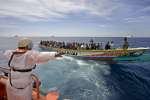UNHCR concerned over Spain's bid to legalize push-backs from enclaves
News Stories, 28 October 2014
MADRID, Spain, October 28 (UNHCR) – The UN refugee agency on Tuesday said it was concerned about a proposal by Spain to legalize automatic returns of people trying to cross border fences into its North Africa enclaves of Ceuta and Melilla.
Under this initiative, a person trying to access Ceuta and Melilla irregularly and without the required documentation, would be automatically rejected and would not be entitled to the legal guarantees foreseen in national and European Union (EU) law relating to the right of an individual to seek asylum.
The two Spanish cities are the only land borders between the EU and Africa. Since last year, there has been an increase in the number of people arriving irregularly through this route. There has also been an increase in the proportion of those coming from countries torn by war, violence and persecution, including Syria, Central African Republic and Mali.
"In 2013, around 4,200 people entered the enclaves irregularly [by land and sea]. So far this year, over 5,000 people have arrived, including 2,000 people fleeing the conflict in Syria [of whom 70 per cent are women and children]," UNHCR spokesman William Spindler said in Geneva.
As a response to the influx, the Spanish government has proposed an amendment to current law to be applied exclusively at the Ceuta and Melilla borders. The proposal introduces the concept of "rejection at the border" and aims at legalizing the current practice of push-backs. This practice would not provide any opportunity for those fleeing persecution and conflict to request asylum.
"In this context, UNHCR stresses the importance of permitting access to territory to seek international protection," Spindler said. "UNHCR understands the complexity of border management in Ceuta and Melilla. However, the government should ensure that any legal initiative complies with its international obligations, particularly the 1951 Refugee Convention," he added.
Spindler said UNHCR was also concerned about the growing use of violence at the border to deter migrants and asylum-seekers from entering. This year there have been several violent incidents documented and increased reports of push-backs from the enclaves.
Most recently, on October 15, images show border authorities using violence during an attempt by about 200 people to cross the high border fences into Melilla. "UNHCR calls upon the Spanish authorities to ensure that no violence is exercised at the Spanish borders and that they are managed with full respect for human rights and refugee law. UNHCR stands ready to support the Spanish authorities," Spindler said.




















